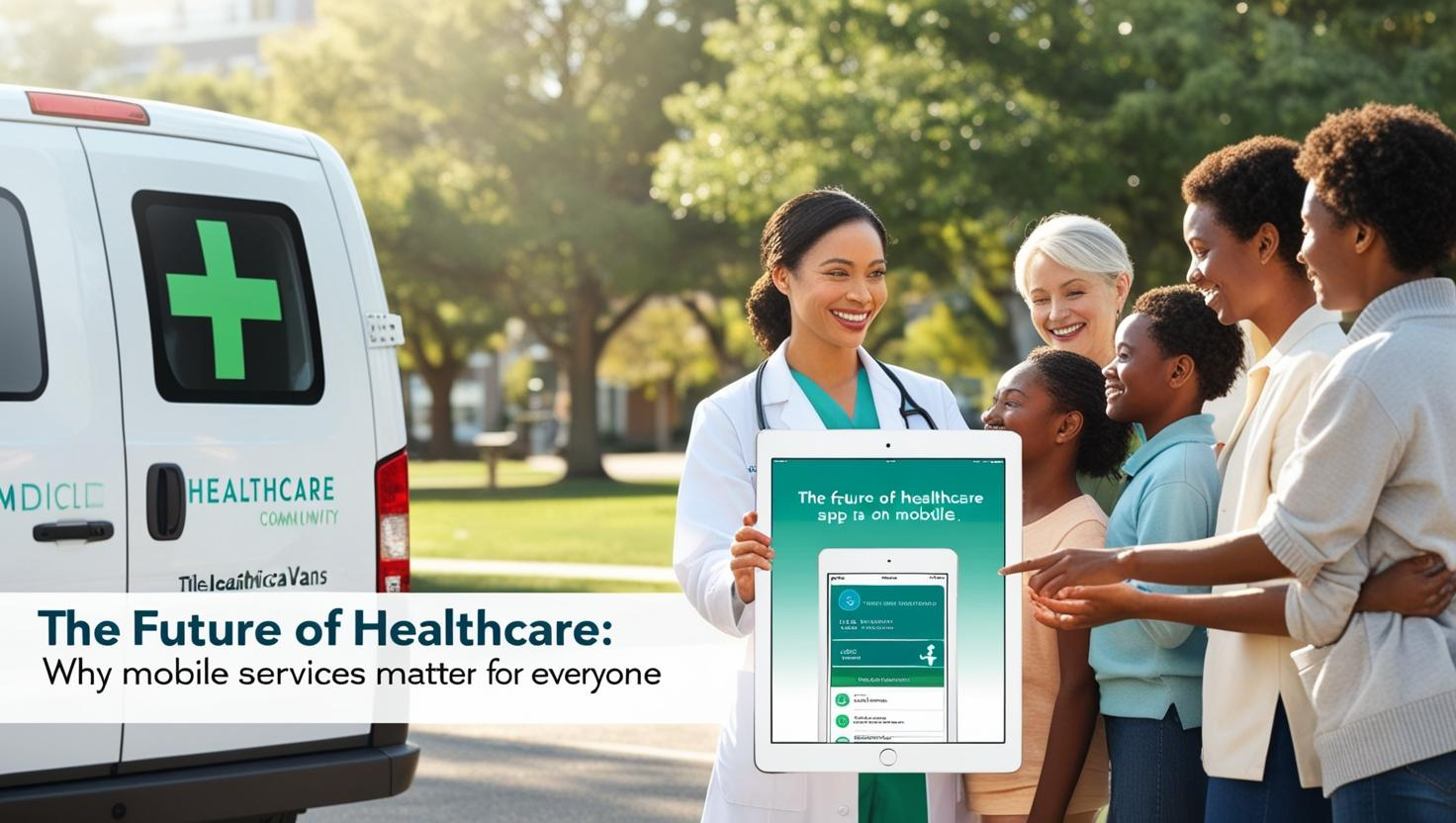- Home
- About Us
- Services
- Primary Care
- Preventative Services
- Transitional Care
- Annual Wellness Exams
- Acute Care Services
- Medical Clearance Examinations
- Chronic Disease Management
- Sports Physicals
- Geriatric Medicine
- Medication Management
- STD & UTI Testing
- Coordination of Care
- Telehealth Services
- Ordering Routine Labs and Scans
- Blog
- Patient Resources
- Contact Us

Mary Huntly APRN FNP-C
Key Takeaways
- Mobile health services like clinics and apps are breaking down traditional barriers to care, bringing services directly to patients.
- Advancements in healthcare technology are improving accessibility, reducing costs, and delivering better outcomes—especially for underserved populations.
- Trinity Family Practice in Las Vegas is already adopting mobile healthcare solutions to meet patients where they are, offering a convenient, patient-centered approach to general medicine.
Healthcare is evolving. Thanks to advancements in technology, mobile health services are shaping the way we think about access to care. Imagine receiving top-tier healthcare without the hassle of long commutes, crowded waiting rooms, or other obstacles that make visiting a traditional clinic challenging. Sounds promising, right?
This blog will take you through how mobile health services, such as mobile clinics and innovative healthcare apps, are breaking barriers to provide equitable, efficient, and patient-centered care for everyone. As we look ahead, mobile health is no longer just an option—it’s becoming a necessity in our rapidly changing world.
The State of Healthcare Today
Accessing quality healthcare has traditionally been a challenge for many people due to geographic, financial, or systemic barriers. However, with advancements in technology and the rise of mobile health solutions, these obstacles are gradually being addressed.
Many patients continue to fall through the cracks, especially in rural or low-income areas. Mobile health services are transforming the way care is delivered, making it more accessible, flexible, and convenient for patients from all walks of life. By leveraging innovation, we can close the gaps in care and create a more inclusive healthcare experience.
Challenges Facing Healthcare Providers
The healthcare industry is stretched thin. Across the globe, providers face the same challenges of delivering quality care while managing high costs and navigating complex regulations.
The Growing Need for Scalable Solutions
But one of the biggest hurdles? Reaching populations that struggle to access care. As health systems grow increasingly complex, it’s critical to find ways to deliver services that are both efficient and inclusive. Addressing the root causes of inaccessibility can drastically improve outcomes and reduce overall healthcare spending.
For countless individuals, healthcare remains out of reach due to several barriers:
- Geographical Barriers – Rural areas often lack nearby healthcare facilities.
- Financial Hardship – High healthcare costs discourage many from seeking preventive care.
- Social Factors – Language barriers, stigma, or a lack of trust in the healthcare system can prevent people from accessing the care they need.
Unfortunately, poor access compounds the issue, leading to poor health outcomes and skyrocketing healthcare costs. Finding scalable, effective solutions has become a top priority for today’s providers.
Limited Access to Health Care
Access isn’t just about proximity to services—it’s about availability, affordability, and inclusivity. Even patients who live near clinics may still face logistical hurdles or systemic inequities that make consistent care difficult to maintain.
Why Access Matters More Than Ever
When patients lack access to healthcare, it has a ripple effect that impacts entire communities. Preventable conditions go untreated, chronic illnesses worsen, and emergency departments become overwhelmed. Mobile health services offer a viable path forward to reversing this trend.
- The Cost of Limited Access – Without regular preventive care, individuals often rely on emergency services, which are more expensive and less effective for long-term health management.
- Health Disparities – Lack of access disproportionately affects underserved populations, exacerbating existing inequalities.
Here’s where innovation steps in. Mobile health clinics are rapidly becoming a reliable and flexible way to reach communities that need care the most.
Mobile Health Clinics: A Solution for Improved Access
Mobile health clinics bridge the gap between traditional healthcare facilities and patients who face barriers to access. By bringing essential medical services directly to underserved areas, they ensure that more individuals receive the care they need.
These clinics don’t just treat illness—they prevent it. With the ability to deliver comprehensive, proactive care, mobile clinics help reduce hospital visits, improve community health, and make care more convenient for everyone involved.
What Are Mobile Health Clinics?
At their core, mobile health clinics are healthcare facilities on wheels—but they’re so much more than that.
Equipped with medical-grade technology, these vehicles bring a spectrum of services right to a patient’s doorstep, covering everything from primary and preventative care to dental and mental health services.
- Independent or Extension Models – Some mobile clinics operate as standalone units, while others are part of larger healthcare systems.
- Flexible Offerings – Services include physical exams, disease management, vaccination drives, and even specialized care like cancer screenings.
They’re transforming the traditional idea of a healthcare visit and expanding possibilities for where, when, and how care is delivered.
Mobile Clinic Services and Healthcare Technology
The power of mobile clinics goes beyond the wheels—they’re fully equipped with cutting-edge healthcare technologies.
These tools not only enhance care delivery but also ensure providers can maintain the same quality standards seen in brick-and-mortar clinics. The integration of digital platforms, secure data management, and telemedicine makes mobile clinics a comprehensive care solution.
- Electronic Health Records (EHRs) – Providers can track and store patient data securely in the clinic, ensuring continuity of care.
- Telemedicine Capabilities – Patients can connect with specialists remotely, extending the range of services mobile clinics can offer.
- Health Education and Outreach – Many mobile units incorporate educational materials or workshops, empowering patients to make healthier lifestyle choices.
Want to bring this level of innovation and convenience to your care experience? Trinity Family Practice offers mobile services designed to meet your healthcare needs—right where you are.
Improving Access to Health Care Through Mobile Services
Mobile health clinics play a critical role in breaking down barriers to care by bringing essential health services directly to the communities that need them most. By addressing challenges like transportation, affordability, and accessibility, these clinics offer a flexible and effective solution to improve health outcomes for underserved populations.
These services not only help patients but also ease the burden on emergency departments and overbooked clinics. The end result? Healthier individuals and stronger communities.
Mobile Health and Access to Health Care
Mobile health services address accessibility challenges head-on.
- Convenience – By meeting patients where they are (literally), these services eliminate logistical issues like travel costs.
- Preventive Care – Mobile clinics offer regular screenings and check-ups that reduce the need for emergency department visits.
- Better Outcomes – Patients gain timely access to the care they need, improving long-term health.
One study even found that mobile health clinics save $11 in healthcare costs for every $1 invested.
Data Analytics and Mobile Health Clinics
Data plays a crucial role in making mobile clinics even more effective.
Using real-time insights, providers can fine-tune their outreach efforts, track outcomes, and ensure the right services are delivered to the right people. This ensures that no community is overlooked.
- Understanding Patient Demographics – Analytics help providers identify which communities require specific services, ensuring resources are allocated wisely.
- Tracking Health Trends – By analyzing patient data, mobile clinics can identify patterns and address urgent health concerns, like outbreaks.
- Driving Quality Improvements – Data insights inform better decision-making and continuous improvements in service delivery.
Ultimately, this creates a cycle of improvement that benefits patients and providers alike.
The Role of Healthcare Applications in Mobile Health
Mobile health, or mHealth, has transformed the way healthcare is accessed and delivered. With the integration of healthcare applications, patients and providers can now experience enhanced communication, monitoring, and management of health services. These tools play a crucial role in increasing accessibility and efficiency, particularly for individuals in remote or underserved areas.
Apps are now an essential bridge between patients and providers, enabling real-time support, reminders, and data sharing without the need for a physical appointment.
Healthcare Applications for Providers and Patients
Enter mobile healthcare apps—a game-changer in patient engagement and service efficiency.
- Empowering Patients – Apps give patients direct access to their medical records, appointment schedules, and prescription lists, fostering transparency and trust.
- Streamlined Communication – Patients can easily contact their providers, whether for advice, follow-ups, or quick health updates.
- Accessible Anywhere – Patients take control of their health, whether they’re at home, on the go, or traveling.
For providers, the benefits are just as significant. Apps improve workflow management, patient tracking, and even data-sharing across teams.
The Future of Mobile Healthcare
The landscape of healthcare is evolving rapidly, and mobile technology is at the forefront of this transformation. With intuitive apps and innovative features, mobile healthcare is breaking down barriers, making quality care more accessible and personalized than ever before.
As more healthcare systems embrace mobile solutions, we can expect better health outcomes, reduced costs, and more empowered patients.
Investment in Mobile Healthcare Solutions
The future of healthcare is here, and investing in mobile solutions will be critical for widespread adoption.
- Expanding Reach – From rural communities to urban centers, mobile healthcare ensures no one is left behind.
- Cost Reductions – By tackling health issues early, these solutions help prevent costly complications down the line.
- Building Resilient Communities – Mobile solutions strengthen the overall healthcare system, creating a healthier, more equitable world.
Organizations like Trinity Family Practice are already leading the charge, ensuring comprehensive care is within everyone’s reach.
Book Your Mobile Health Appointment Today
Take control of your health with services designed to meet you where you are—literally.
Schedule an appointment with Trinity Family Practice in Las Vegas today and experience compassionate, comprehensive care brought directly to your home.
Whether you need a routine check-up or chronic disease management, our team is here to support your journey to better health—no matter where you are.
POST TAGS :
Trinity Family Practice is dedicated to offering personalized, compassionate healthcare for individuals and families in Las Vegas, with a focus on quality care you can trust at every visit.
Address
Contact
(725) 214-4237
admin@trinityfamilypractice.com
